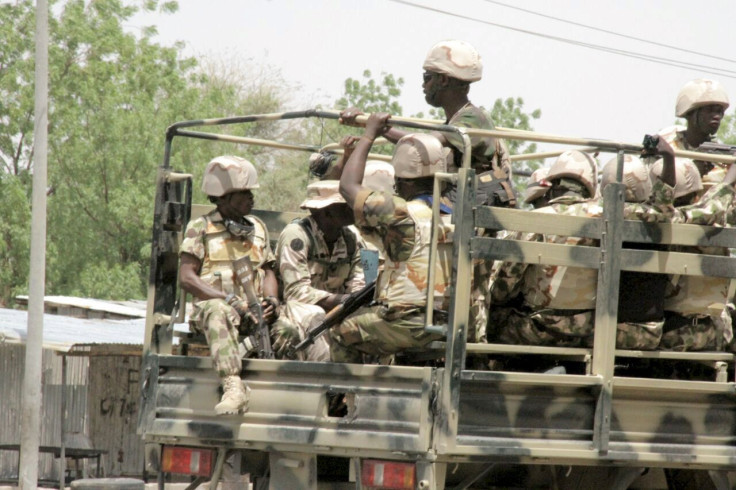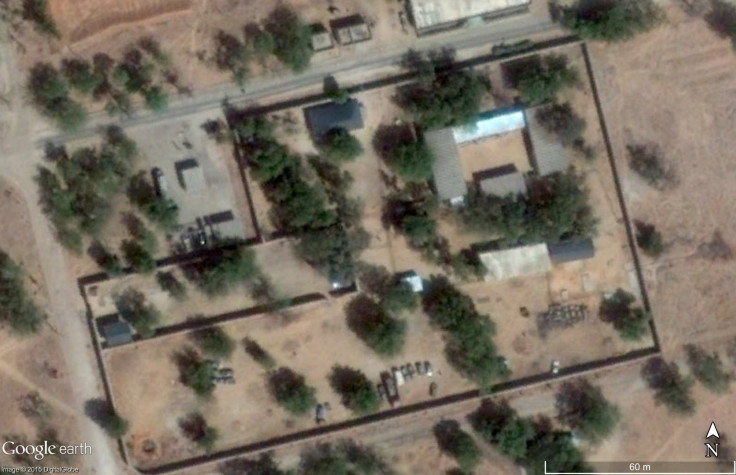Nigeria’s Military Unlawfully Killed 1,200 People During Hunt For Boko Haram: Amnesty International

The Nigerian military on the front lines against Boko Haram stands accused of mass murder and other war crimes. Since it began fighting the militant group in 2009, it has been criticized for being underfunded, corrupt and ineffective. But according to a new report from Amnesty International, officers may also be responsible for possible crimes against humanity.
“For years the Nigerian authorities have downplayed accusations of human rights abuses by the military. But they cannot dismiss their own internal military documents,” Salil Shetty, Amnesty International’s secretary general, said in a Monday statement. “They cannot ignore testimonies from witnesses and high-ranking military whistleblowers. And they cannot deny the existence of emaciated and mutilated bodies piled on mortuary slabs and dumped in mass graves.”
Nearly 8,000 people were murdered, starved, suffocated and tortured to death by members of the Nigerian military, according to the report issued Wednesday by Amnesty International. The international organization has detailed a series of war crimes committed by members of the Nigerian military while it was fighting the militant group Boko Haram.
“All I know was that once you get detained by the soldiers and taken to Giwa [military barracks], your life is finished,” one former detainee told Amnesty researchers.
The details were outlined in the report “Stars on Their Shoulders. Blood on Their Hands: War Crimes Committed by the Nigerian Military,” which details how more than 1,200 people were unlawfully killed and more than 7,000 men and boys died during military detention between March 2011 and February 2012.
“This sickening evidence exposes how thousands of young men and boys have been arbitrarily arrested and deliberately killed or left to die in detention in the most horrific conditions,” Shetty said. “It provides strong grounds for investigations into the possible criminal responsibility of members of the military, including those at the highest levels.”
The data is based on years of interviews with senior members of Nigeria’s military, victims and eyewitnesses, as well as leaked military reports or correspondence.
The military has arrested at least 20,000 people, including some as young as 9 years old, since it began its fight against Boko Haram five years ago. The terrorist group, which recently pledged allegiance to the Islamic State group, has killed more than 12,000 people in increasingly violent attacks across Nigeria’s northeast in the past five years.
“In most cases they were arbitrarily arrested, often based solely on the word of a single unidentified secret informant,” the report says. During raids, security forces rounded up hundreds of men, almost none of whom have been to a court trial and endure inhumane conditions.
“Detainees are held incommunicado in extremely overcrowded, unventilated cells without sanitary facilities and with little food or water,” according to the report. “Many are subjected to torture and thousands have died from ill-treatment and as a result of dire detention conditions.”
In 2013, more than 4,700 corpses were delivered to the mortuary from the Giwa military barracks. A high-ranking military official told Amnesty that 683 detainees died in custody between October 2012 and February 2013.
“The soldiers said: ‘Welcome to your die house. Welcome to your place of death,’ ” a former detainee told Amnesty. He was one of just 11 survivors from a group of 122 arrested.

Other former prisoners said they would be left without food or water for days and were subject to massive outbreaks of diseases such as cholera. Some former detainees say their cells were fumigated with pesticides used to kill mosquitos, which caused other deaths. Military officials told Amnesty the conditions were due to a lack of funding.
Giwa was never built to be a detention facility but ended up holding more than 2,000 detainees at one time.
“Hundreds have been killed in detention either [by soldiers] shooting them or by suffocation,” according to one military officer’s account detailed in the report, describing a placed called Sector Alpha detention center, where Amnesty reports 47 detainees once died on a single day -- June 19, 2013.
Amnesty has also seen video evidence and heard reports of torture by the military.
“Former detainees and senior military sources described how detainees were regularly tortured to death, hung on poles over fires, tossed into deep pits or interrogated using electric batons,” the report says.
In addition, the Nigerian military killed more than 1,200 people in extrajudicial executions as recently as last year. On March 14, 2014, the military killed more than 640 detainees who fled Giwa barracks after a Boko Haram attack, according to the report.
One military official said that soldiers would “go to the nearest place and kill all the youths. … People killed may be innocent and not armed.”
Many of these deaths were documented and sent to army headquarters through daily field reports.

The report lists nine senior military officials by name and calls for an investigation into their involvement in war crimes of murder, torture and enforced disappearance, along with five other high-level officers who may be responsible for failing to act with the knowledge that these were happening.
“Whilst an urgent and impartial investigation of these war crimes is vital, this report is not just about the criminal responsibility of individuals. It is also about the responsibility of Nigeria’s leadership to act decisively to end the pervasive culture of impunity within the armed forces,” Shetty said.
“People at the top saw it but refused to do anything about it,” one source told Amnesty, which called on newly elected President Buhari, who ran on a platform of anti-corruption, to start an investigation immediately.
© Copyright IBTimes 2024. All rights reserved.






















